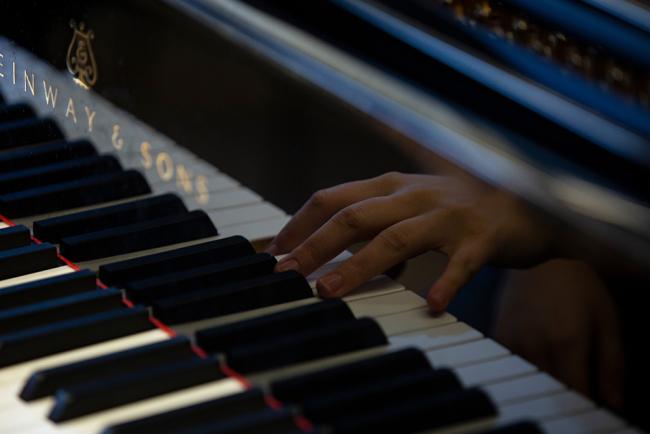Competing Is Part of Being a Musician
2025-11-20Pianist Sebastian Iivonen is enrolled in the Artistic Master’s Program for Musicians at Ingesund School of Music. He has just completed a semifinal in the Solistpriset, Sweden’s foremost soloist competition and the Royal Swedish Academy of Music’s largest award for young musicians, presented every two years.
“I’m so satisfied and happy to have participated. I did my best and was well prepared, so I’m pleased with my performance. I was able to enjoy it and played from the heart.”
What is it like to compete in such a major competition?
“It’s always a bit nerve-wracking, even though I’ve competed in major competitions all over the world and have some experience. Playing a concert is completely different—the audience is there to support you and, above all, to enjoy the music. In a competition, however, it’s different; every note you play on the piano is judged. Certain factors in this particular competition made me more nervous. For example, as pianists, we are very dependent on being able to test the grand piano beforehand, but here we didn’t have that opportunity. That made me a bit anxious because I had to get a feel for the instrument during the first bars of my opening piece while being judged at the same time. Naturally, we pianists can’t bring our own instrument, but it was the same for all participants, and now I’m richer in experience.”
How important is it for an aspiring musician to take part in competitions?
“It depends a bit on what you want to do with your music-making. Competition and rivalry are things you can’t escape as a musician. But when it comes to competitions like these, you should ask yourself why you make music—what is your purpose? If you win, you have a few years ahead of you as a soloist. However, you must always make sure to keep your artistic expression intact so you don’t get swept up in the competitive aspect to the point where it becomes a sport. You should play from the heart. If you’re a musician who makes music for art’s sake, competitions might not be as relevant. But competing is useful; you grow as a musician through preparation, performance, and so on. And the entire industry is one big competition for jobs. Even successful soloists must constantly find ways to stay relevant and up to date.”
Does having participated in major competitions matter when applying for jobs later on?
“Yes, as a pianist it’s hard to get a permanent position, but if you want to perform on concert stages worldwide, it’s definitely a merit to have participated in prestigious competitions. It’s a mark of recognition and a promise of quality—the competition is a bonus. You can be technically skilled, but that might not matter if you don’t convey something to your audience, because they are the most decisive jury. It’s about how an artist expresses themselves and how that moves people. That brings us to what a musician should convey—listeners want to be touched.”
“Before you win someone else’s heart, you first need to win your own. Only then can you convey emotions. A very young, talented pianist who masters the instrument may still struggle to express and describe feelings. Sure, you can reflect and mirror them through music after reading a book or watching a film, but you might not have experienced them in your own life yet, or perhaps haven’t understood literature or other art you’ve encountered on a deeper level. It’s only through your own experiences and impressions that you truly understand what it’s about and can convey emotions on a deeper level.”
How do you prepare for a competition?
“I practice a lot and analyze the sheet music for the pieces I’ll perform—especially the fast sections, which are physically and technically more demanding. Muscle memory is very important, but it’s also the first thing to falter when you’re nervous because your body suddenly feels different. I’d estimate that about 40 percent of my preparation happens at the instrument; the rest is mental preparation, which is the biggest part of the work. When we get nervous, we’re physically affected—we freeze, we tense up, and so on.”
How many pieces do you usually prepare?
“You normally need to have 2–3 hours of repertoire ready; how much you actually play depends on how far you progress in the competition. In Solistpriset, I personally performed works by five different composers and played a total of seven shorter pieces, amounting to 20 minutes of music.”
In a previous interview, you said it’s important to have a lot of repertoire at your fingertips. How many pieces do you have memorized?
“It’s hard to know exactly how many pieces I have in my head, but if I get the sheet music in front of me, it doesn’t take long before the piece comes back. But when I prepare for a competition, as I said, I need 2–3 hours of fresh music ready to go—on top of chamber music.”
Any more competitions planned?
“In 2026, I’m planning for some major international competitions, but the biggest one is the George Enescu International Competition 2026 in Bucharest, Romania, in September, with applications opening in the spring. There are also some interesting competitions during the summer; I’ll see what I can manage.”
Are you graduating this spring? What are your future plans?
“Ingesund School of Music means a lot to me, and honestly, I don’t want to leave. I love my professor Julia Mustonen Dahlkvist very much, and Ingesund has all the resources to train future musicians. I’ll probably take an independent course in the fall, most likely the Artist Diploma course. But my base will probably be in my hometown of Stockholm, where I run a concert series together with a friend, John Nalan. In the long term, I’ll work from there as a freelance musician and perform with various orchestras around the country.”
Sebastian Iivonen and Julie Haismann, both students in the Artistic Master’s Programme in Music at Ingesund School of Music, participated in the semifinal of the Solist Prize 2025. They have also advanced to the semifinal of Anders Wall’s Music Prize 2025 with the piano theme, together with more Ingesund students: Astri Aareskjold, Nikita Khnykhin, Herman Pellbäck, and Francis Karpeskis. They are among Sweden’s 10 best young pianists and are competing for prestigious prizes and a spot in the final during the third weekend of November.




